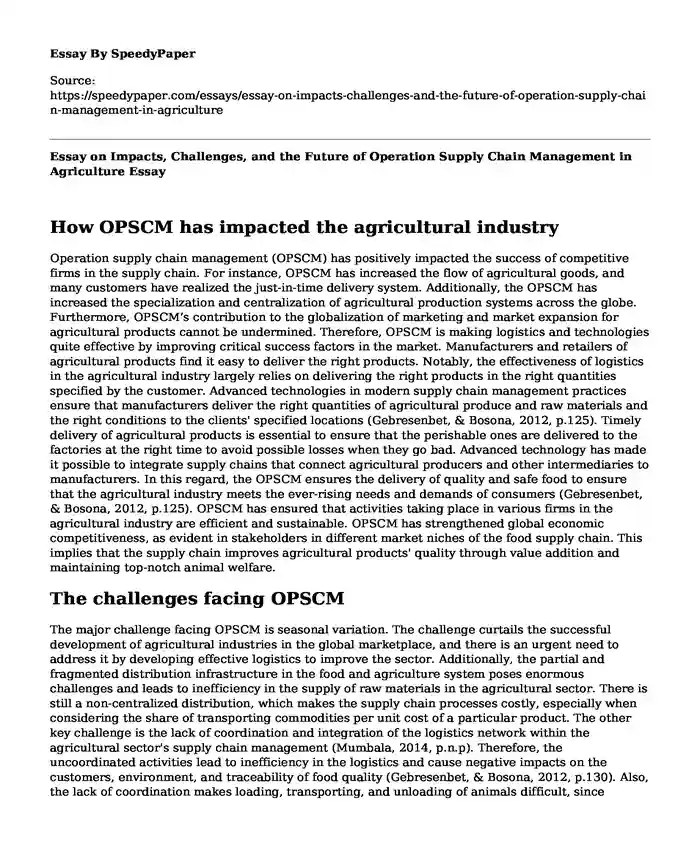
| Type of paper: | Essay |
| Categories: | Agriculture Supply chain management |
| Pages: | 3 |
| Wordcount: | 695 words |
How OPSCM has impacted the agricultural industry
Operation supply chain management (OPSCM) has positively impacted the success of competitive firms in the supply chain. For instance, OPSCM has increased the flow of agricultural goods, and many customers have realized the just-in-time delivery system. Additionally, the OPSCM has increased the specialization and centralization of agricultural production systems across the globe. Furthermore, OPSCM’s contribution to the globalization of marketing and market expansion for agricultural products cannot be undermined. Therefore, OPSCM is making logistics and technologies quite effective by improving critical success factors in the market. Manufacturers and retailers of agricultural products find it easy to deliver the right products. Notably, the effectiveness of logistics in the agricultural industry largely relies on delivering the right products in the right quantities specified by the customer. Advanced technologies in modern supply chain management practices ensure that manufacturers deliver the right quantities of agricultural produce and raw materials and the right conditions to the clients' specified locations (Gebresenbet, & Bosona, 2012, p.125). Timely delivery of agricultural products is essential to ensure that the perishable ones are delivered to the factories at the right time to avoid possible losses when they go bad. Advanced technology has made it possible to integrate supply chains that connect agricultural producers and other intermediaries to manufacturers. In this regard, the OPSCM ensures the delivery of quality and safe food to ensure that the agricultural industry meets the ever-rising needs and demands of consumers (Gebresenbet, & Bosona, 2012, p.125). OPSCM has ensured that activities taking place in various firms in the agricultural industry are efficient and sustainable. OPSCM has strengthened global economic competitiveness, as evident in stakeholders in different market niches of the food supply chain. This implies that the supply chain improves agricultural products' quality through value addition and maintaining top-notch animal welfare.
The challenges facing OPSCM
The major challenge facing OPSCM is seasonal variation. The challenge curtails the successful development of agricultural industries in the global marketplace, and there is an urgent need to address it by developing effective logistics to improve the sector. Additionally, the partial and fragmented distribution infrastructure in the food and agriculture system poses enormous challenges and leads to inefficiency in the supply of raw materials in the agricultural sector. There is still a non-centralized distribution, which makes the supply chain processes costly, especially when considering the share of transporting commodities per unit cost of a particular product. The other key challenge is the lack of coordination and integration of the logistics network within the agricultural sector's supply chain management (Mumbala, 2014, p.n.p). Therefore, the uncoordinated activities lead to inefficiency in the logistics and cause negative impacts on the customers, environment, and traceability of food quality (Gebresenbet, & Bosona, 2012, p.130). Also, the lack of coordination makes loading, transporting, and unloading of animals difficult, since employees in the agricultural industry may not be well conversant with the activity registration on routes and slaughter activities.
The future of OPSCM in the agricultural industry
There will be intense competition among future supply chains as they scramble for efficient performance to realize their full potential in value addition. By adding value, future OPSCM will strive to meet customers' demands through timely, quality, and coordinated delivery of agricultural products, and avoid unnecessary delays. Additionally, future OPSCM will form more cooperatives to increase their bargaining power and ensure that agricultural firms can access competitive markets globally (Tradegecko, 2020, p.n.p). This will allow them to gain a significant share of new market opportunities; hence, attaining the products and services competitively and at relatively lower costs with manageable risks.
References
Gebresenbet, G., & Bosona, T. (2012). Logistics and Supply Chains in Agriculture and Food. In the book: Pathways to Supply Chain Excellence. https://www.researchgate.net/publication/221928911_Logistics_and_Supply_Chains_in_Agriculture_and_Food
Tradegecko. (2020). Chapter 5: 10 Supply Chain Management Trends. Blog. TradeGecko Pte. Ltd. Retrieved on August 7, 2020, from https://www.tradegecko.com/supply-chain-management/future-trends
Mumbala, G. (2014). Food and Agriculture Organization of the United Nations. An investigation of the Supply Chain challenges faced by small-scale crop farmers at Etunda Irrigation Farm in Namibia. Harold Pupkewitz Graduate School of Business Press. http://www.fao.org/family-farming/detail/en/c/327868/
Cite this page
Essay on Impacts, Challenges, and the Future of Operation Supply Chain Management in Agriculture. (2023, Nov 07). Retrieved from https://speedypaper.com/essays/essay-on-impacts-challenges-and-the-future-of-operation-supply-chain-management-in-agriculture
Request Removal
If you are the original author of this essay and no longer wish to have it published on the SpeedyPaper website, please click below to request its removal:
- Microeconomics Essay Sample
- Employee Privacy Rights and Packet Sniffers. Free Essay Sample.
- Essay Example on the Issues of Humanitarianism and Humanitarian Intervention
- Essay Example on The Current Supply Chain for Palm Oil
- A Case Method Approach of Teaching Cost-Volume-Profit - Essay Example
- Transformative Shifts: From Agricultural Innovation to Industrial Revolution in 18th-Century Britain - Essay Sample
- Free Report Sample - Duties and Responsibilities of Chief Compliance Officer
Popular categories




